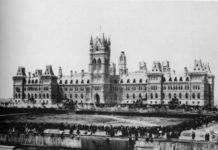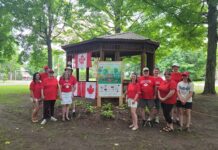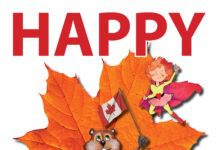Canada Day has become such a central part of the Canadian year that it is easy to forget that it is a very recent arrival on the scene. On October 27, 1982, the Parliament of Canada initiated Canada Day following the repatriation of the Canadian Constitution that year. Before 1982, July 1 was known as Dominion Day, and had been acknowledged as Canada’s birthday from the date when the British North America Act came into force in 1867. The following year, 1868, the Governor General at the time suggested that Canadians celebrate Dominion Day as their National Holiday.
Surprisingly, Dominion Day was not itself a major event for decades after 1867. It took another ten years before there was any legislation passed for the recognition of the holiday. In fact, the first official government celebration of Dominion Day only happened in 1917, on the 50th anniversary of Confederation. The Canadian Government started organising official celebrations in 1958, and it was after that that the name “Canada Day” started to be used. There was, however, great argument among Canadians about using that term, as it seemed a break with tradition. However, the plain truth is that there was very little tradition of Dominion Day celebrations before the 1950’s.
In North Grenville one hundred years ago, Dominion Day was a hit and miss affair. Some years there were celebrations in Kemptville, other years the day passed without comment or activities of any kind. It seems that the day’s events depended on various groups and organisations within the community, just as is true today. In 1911, the events were sponsored by the local Catholic Church congregation. A large dinner was held in the Agricultural Hall, put on by the ladies of the congregation, and was attended by the Secretary of State, Charles Murphy, as well as the local M.P.P., G. Howard Ferguson. Murphy pointed out that the occasion was “not racial, not sectarian; but national”, and praised the rise of Imperial sentiment in Canada in the years since Confederation. Ferguson, who would one day be Premier of Ontario, stated that the province was the best place in the country, and would “remain the Banner Province of the Dominion”.
After the speeches came the athletics. Races were held over various distances, from the hundred yards dash, to the two mile marathon. Needless to say, only males were allowed to race. No-one from Kemptville won a race, though in the Boys’ Race, W. McGovern of Oxford came first, and Harold McGahey came second. The big event of the afternoon was the baseball match between Kemptville and Merrickville, which the home team won 3 -2. Music throughout was supplied by the Harmony Band of Smith’s Falls, this being one of those periods when Kemptville was without a band of its own. The people then adjourned back to the Hall for a supper, also served by the ladies of the Catholic Church. By the time a big storm blew in that evening, the crowds had already wound their way home.
In 1912, it was the Baseball Club that ran the day’s events. The day started with a parade, or a “Trade Procession” as it was called then. It began at Riverside Park, wound around the streets, and ended up back at the Park again. The parade was led by the Texan Ranger Band from Ottawa. Who they were is unclear, but the Texan theme ran through the day’s festivities. The Band, accompanied by two pipers, played for an hour outside the Advance building on Prescott Street, filling in the time before the main event of the day: the sports activities in Riverside Park, where there were races, both human and horse, and a wonderful event called “Catch the Greasy Pig”. The big baseball game was between Kemptville and Spencerville, and all went well aside from some Spencerville teenagers who took to insulting anyone not from their town.
In the evening, there was a special concert at the Oddfellows Hall, which included an escape artist, whose ability to free himself from handcuffs and the “torture cabinet” amazed the audience. There were also “Scotch” dancers, and comedy from Sam and Guss, “the colored comedians”. And, to round off the day, the Texan Concert Orchestra provided the music for a dance at the Hall.
The following year, 1913, it seems there were no celebrations, possibly owing to the lack of an organising group. But, looking at the reports of Dominion Day one hundred years ago, what is surprising is how little it has changed. They had Dominion Day, and we have Canada Day. We still have our activities through the afternoon in both Kemptville and Oxford Mills, and an evening of music to end the day at Riverside Park. They had concerts and we have fireworks. But the event is still focussed on the celebration of Canada and its people. For years before the Government saw fit to celebrate the day officially, the people of North Grenville were marking the occasion with music, fun and sports. Long may that continue.








